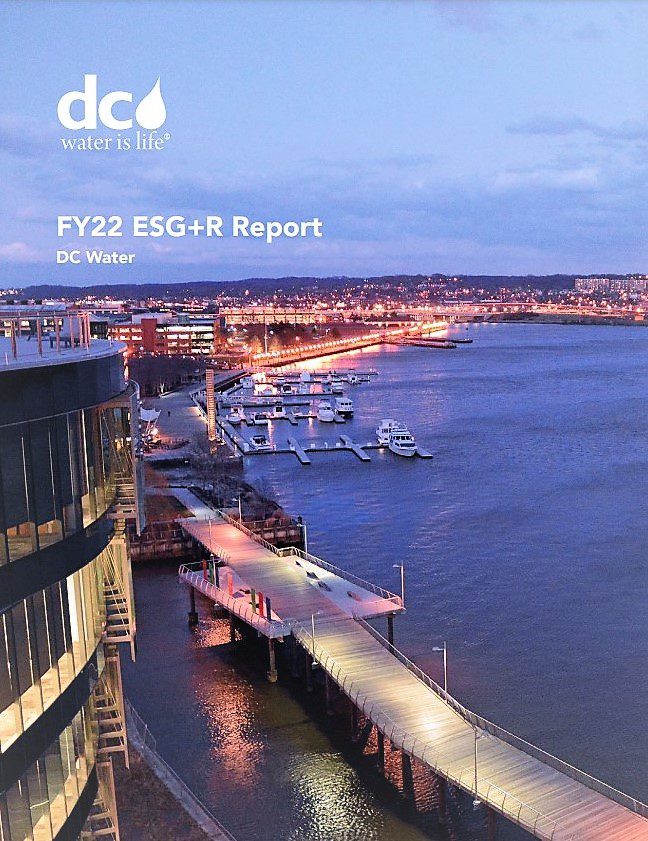Utility’s investor ESG report updates community on sustainability, social impacts
May 18, 2023

AWWA Articles
Utility’s investor ESG report updates community on sustainability, social impacts
DC Water’s environmental, social and governance (ESG) report is making the utility more attractive to investors while boosting its transparency and credibility with customers, officials say.
 And it’s pointing out risks that will help DC Water weather future challenges related to climate change, workforce shifts and infrastructure needs, among others.
And it’s pointing out risks that will help DC Water weather future challenges related to climate change, workforce shifts and infrastructure needs, among others.
“This idea of any organization staying off the front page of the paper and burying their head in the sand is just not reality anymore,” said Matt Ries, DC Water’s director of strategic leadership and sustainability, who has overseen development of the utility’s ESG reports for the past two years. “If you’re not going to be transparent, you’re going to lose your credibility.” (Pictured right, photo from DC Water’s ESG report.)
ESG reports allow businesses to track sustainability efforts, identify risks and summarize their performance. DC Water developed its first ESG report in 2021 and added resilience to the title in 2022. Though these documents are common in the corporate world, DC Water officials say they’re the first public utility in the nation to issue an ESG report.
 “What gets measured gets done, and in this case, what gets measured is environmental, social and governance goals,” said Ries (pictured left).
“What gets measured gets done, and in this case, what gets measured is environmental, social and governance goals,” said Ries (pictured left).
DC Water provides water and wastewater services to more than 700,000 residents and 21 million annual visitors in the District of Columbia. The utility also treats wastewater for approximately 1.6 million people in neighboring jurisdictions.
In 2005, DC Water began implementing the DC Clean Rivers Project, a massive, nearly $3 billion, 25-year effort to control combined sewage overflows, funded in part by a Century Green bond and an environmental impact bond.
As part of the bond’s requirements, the utility gathered data on the project’s progress and impacts. At the same time, DC Water’s auditor said investors were looking for that information in the form of an ESG report.
 “The marketplace was asking for it, and we were starting to feel this momentum for a strong recommendation from the financial committee to issue an ESG report,” Ries said.
“The marketplace was asking for it, and we were starting to feel this momentum for a strong recommendation from the financial committee to issue an ESG report,” Ries said.
The report (pictured right) is aligned with DC Water’s strategic plan, Blueprint 2.0, and reports on the utility’s successes – and shortfalls – as it prepares for future risks to its system.
Investors are the report’s primary audience, but it’s a public document that’s shared with DC Water’s board of directors, city council, stakeholders, employees and customers.
“Before we did this, I wouldn’t have thought that we’d see such a cultural shift around transparency and data,” he said. “But this is going to the board of directors, the mayor’s going to get a copy of this. That’s different than an internal discussion about performance metrics.”
Notable findings of the 2022 report include:
- Forty-three percent of the total energy used for DC Water’s operations in 2022 was derived from renewable energy sources, surpassing its goal by 1 percentage point.
- Eighty-five percent of new jobs within the organization were filled by local residents in underserved communities, surpassing the utility’s goal by 10 percent.
- DC Water secured $20.3 million in federal funding to build a floodwall to protect wastewater services from future extreme flooding. This is especially important, Ries said, because climate scientists predict the area’s sea will rise at twice the rate of global average. “It shows a deliberate and thoughtful approach. We don’t have our head in the sand about sea level rise,” he said. “And we’re going through a planning process to approach it in a way that doesn’t result in unaffordable water rates.”
Ries said it can be daunting for utilities to publicize their risks, plans and shortcomings.
“But there’s not an expectation that we’ve identified and addressed all ESG risks now. Investors want to know that we’re taking a deliberate approach to identifying those risks and are coming up with an approach to address those risks,” he said.
Ries encouraged other utilities to put aside intimidation about ESG reports and jump in. Investors are asking for it, and utilities already track much of the data; for DC Water, it was a matter of building a framework modeled after other businesses’ ESG reports and knowing that the report will evolve over time.
“Ultimately, whatever threats that may come at you or at your city or region, you want to know that your utility is going to take care of you,” Ries said. “Whether it’s a drought or a flood or a hurricane, you want to know that we’ve hard-proofed our infrastructure and we have plans for that. We hope this report eases those worries for our ratepayers.”
Advertisement